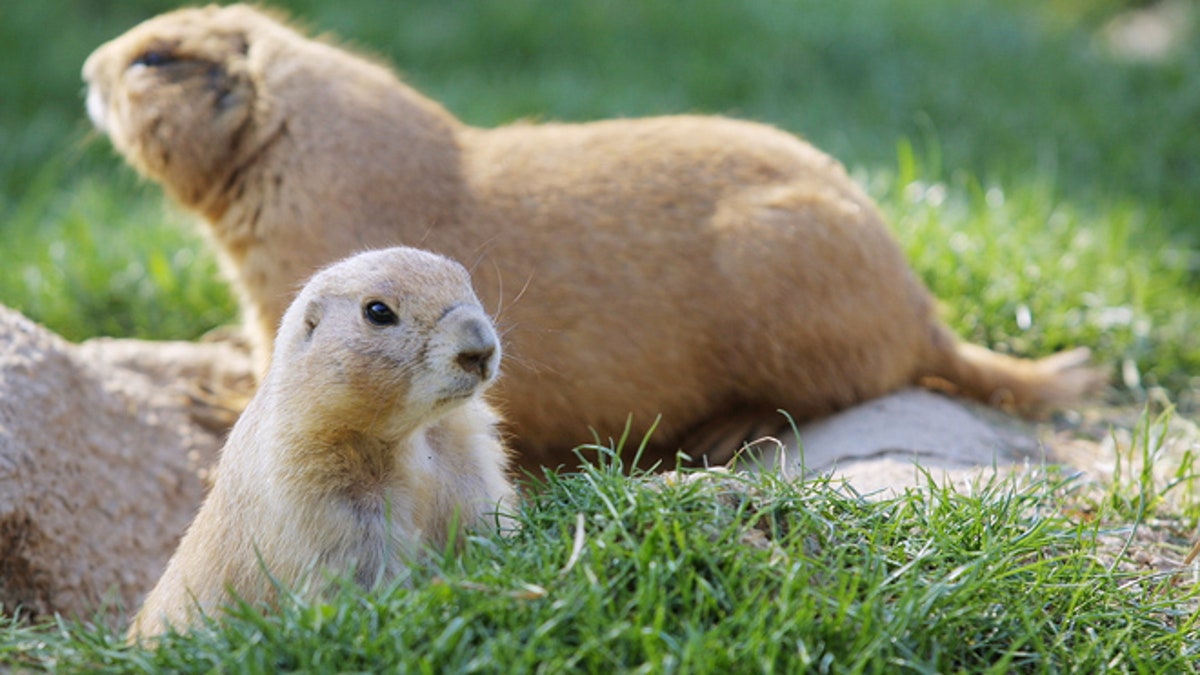
A pair of prairie dogs are pictured on display at the Washington National Zoo. (Reuters)
Bigger is better
"Large animals live longer for two main reasons," zoologist Kevin Healy of Trinity College Dublin told Discovery News. "The first one is that to be large you need more time and resources for growth so it follows you must live longer just to achieve getting large. The second reason is that, once large, an animal is often shielded from many external causes of death such as predators (too big to tackle) or food shortages (as large animals can store large fat reserves)."
Healy led the latest research concerning longevity in birds and mammals. The study is published in the journal Proceedings of the Royal Society B.
Mature slowly
Animals that take a while to reach sexual maturity tend to have longer overall lives. Bowhead whales mature slowly and can live 221 years. Smaller and faster maturing pygmy whales bite the dust much earlier. Humans mature relatively slowly, reaching sexual maturity at about age 12 or 13.
Go underground to avoid problems
Burrowing animals tend to live longer than non-burrowing ones, the study found. Healy explained, "burrowing is an extremely effective means to escape predators both as it is hard to detect burrowing animals and also to have access to them. Burrowing might also help animals in bad weather, such as in cold temperatures, or (serve) as safe storage areas when food is running short."
Forage in the trees
When looking for dinner, foraging in trees helps to ward off threats. Food such as fruit is also relatively easy to obtain. An individual just needs to find it and eat it. Edible tubers, on the other hand, require more of energy investment to locate them and to dig them out.
Specialize in day living
Animals that specialize in day living tend to improve their chances for living a long life. Most birds are day dwellers. Healy said that "crepuscular flying species (species which are most active at both dawn and dusk) had shorter lifespans than flying species, which were active at other times of the day. The reason we think that this might be is that the dusk and dawn periods are relatively short, and hence these species have only a small window in which to feed."
Specialize in night living
Night dwellers do just as well as those that prefer day living, so long as each group sticks to their evolved schedule. Raccoons, bats and many other animals love the nightlife. Most small mammals die relatively young, but some bats can live over the age of 40.
Live in trees
Trees were a great gift to animals. It's no wonder that human ancestors evolved in protective, food-giving trees. Healy said, "Arboreality seems to be a particularly effective way to reduce predation as it is difficult for predators to chase and catch a species adapted to live in trees. Examples of this can be seen squirrels, which can avoid many ground based predators, such as cats, by being more agile when in the trees."
Spend at least some of your time in trees
If evolving to become an arboreal animal isn't in the cards, spending at least some time (semi-arboreal) in trees helps. Genetics, the environment, climate and other factors outside of an individual’s control can affect such decisions. But Healy said, "A species does have some control over its lifespan over evolutionary time." Spending at least some time in trees, for example, can lower stress, which can then reduce the risk for certain health problems.
Fly or glide
The researchers believe that the ability to fly or glide is the number one key to bird and mammal longevity. "This effect is so strong that it overshadows all other ecological variables explaining lifespan variation in volant (flying or gliding) species," the researchers wrote. Taking to the skies offers a great way to escape hunters, and it widens foraging and settlement opportunities.
Fly or glide and grow big
Swans, flamingos and many large sea birds live impressively long lives. A greater flamingo at the Adelaide Zoo in Australia, for example, died at the ripe old age of at least 83.
As for how humans rate, we grow relatively big and can fly in machines. The longest lived humans are in their 120's. The study focused on birds and mammals, but if invertebrates like sponges or clams are included in the mix, human longevity is a drop in the proverbial bucket. Healy said some sponges and clams live well past 250 years.








































